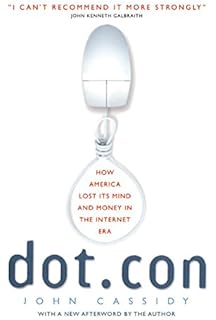On my crowded bookshelf of history texts is one book called Dot Con, which recounts the build-up to, and the bursting of, the Internet bubble. I hadn’t read this book in many years, but I pulled it from the shelf yesterday to thumb through it, since we seem to be living in identical times right now (although with a far more pervasive and much, much bigger, bubble). Here’s one quote I typed in for your reading pleasure. You’re welcome.
“All speculative bubbles go through four stages, each with its own internal logic. The  first stage, which is sometimes referred to as the displacement, starts when something changes people’s expectations about the future…….a few well-informed souls try to cash in on the displacement by investing in the new vehicle of speculation, but most investors stay on the sidelines.
first stage, which is sometimes referred to as the displacement, starts when something changes people’s expectations about the future…….a few well-informed souls try to cash in on the displacement by investing in the new vehicle of speculation, but most investors stay on the sidelines.
The early investors make extremely high returns, and this attracts the attention of others. Next comes the boom stage, when prices are rising sharply and skepticism gives way to greed. The sight of easy money being made lures people into the market, which keeps prices rising, which, in turn, attracts more investors. Eventually, those upstanding citizens who haven’t’ joined in the festivities feel left out. Not just left out. They feel like fools…..
Boom passes into euphoria. Established rules of investing, and often mere common sense, are dispensed with. Prices lose all connection with reality. Investors know this situation can’t last forever, and they vie to cash in before the bubble bursts……a larger and larger group of people seeks to become rich without a real understanding of the processes involved. Not surprisingly, swindlers and catchpenny schemes flourish. Finally, inevitably, comes the bust. Sometimes there is clear reason for the break; sometimes, the market implodes of its own accord. Either way, prices plummet, speculators and companies go bankrupt, and the economy heads into recession. A few months later, everybody looks back in amazement, asking, ‘How did that happen?'”
Sound like anything that might be going on right now?
Since so many years have passed, some of us have forgotten how insane the Internet bubble was, and how optimistic people were about the future. Take note: “The epic stage of the Internet bubble lasted from October 1998 to April 2000. During that period, more than 300 Internet firms did IPOs.” President Clinton declared the national debt would be paid off by the year 2015 (excuse me for just a moment: HA! BWA HA HA! OH MY GOD! BWA HA HA HA HAHHHHH! HAAAAAAA!!!!!!!)
Dot Con also adds this hilarious anecdote “On Sunday, January 30, 2000, Super Bowl XXXIV took place….dotcom companies had sent the cost of a thirty second Super Bowl spot to about $2 million. Seventeen Internet advertisers paid that price, including Computer.com, Epidemic.com, Onmoney.com, Lifeminders.com, kForce.com, and Ourbeginning.com”.
OK, have you heard of ANY of those companies? And yet they were so loaded with venture capital funds, they were able to pay for insanely expensive advertising. I decided to look at these URLs, out of curiosity more than anything else. Here’s what I found:
Computer.com – a really boring site based in Wyoming with articles about technology.
Onmoney.com – doesn’t even load.
Lifeminders.com – a few junk ads. A parked domain.
kForce.com – actually seems to have survived. Still never heard of ’em.
Ourbeginning.com – looks like the domain was taken over by a children’s pre-school.
And as for Epidemic.com………..
Everything that’s going on right now — from the sky-high equity market, to the President’s endless tweeting about record asset values, and the madder-than-a-hatter activity going on with cryptocurrencies, seems to me like a jumping-up-and-down market of bubbles. For safety’s sake, every person with a pulse (including Jim Cramer) has offered up the limp phrase, “This will end badly someday”, more as a verbal insurance policy than anyone else, but their words say one thing and their actions another.
I believe it’s going to end badly someday too. What’s different about my opinion is that I think that “day” is extraordinarily close, if not immediate. Want to see the future? Just hop over to epidemic.com and find it.


